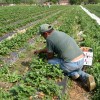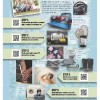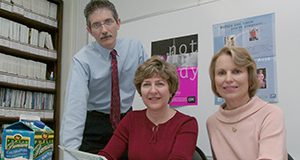Lightning is a common occurrence in Florida. Although lightning kills only about 10% of the people it strikes, it can cause physical and mental complications that victims must face for the rest of their lives. Agriculture workers need to have a good working knowledge of lightning, its effects, and ways to protect others and themselves from this potentially life-threatening hazard. This new 4-page document discusses types of lightning, outdoor safety for farm workers, lightning medical aid, and regulations for employers. Written by Shawn Steed and Alicia Whidden, and published by the UF/IFAS Department of Agricultural and Biological Engineering, October 2018.
http://edis.ifas.ufl.edu/ae526
Category: Workplace
Tailoring Recognition to Fit Your Employees' Needs
Employee recognition plays a key role in the success and continuity of productivity, efficiency, and organizational change. This 2-page document discusses employee recognition practices that you can implement in your workplace. Written by Matt Benge and published by the UF/IFAS Department of Agricultural Education and Communication, February 2018.
http://edis.ifas.ufl.edu/wc298
Next Stop: Job!
 Next Stop: Job is a multi-lesson program designed to teach youth, ages 14 and up, the skills necessary to obtain a job. Through videos and hands-on activities, youth learn essential job market skills, such as marketing, communication, writing skills, and financial literacy, to help them succeed in the workplace. This 28-page publication discusses cover letters, resumes, interviews, proper attire, and management of earnings. Written by Vanessa Spero-Swingle, Laura Cash, Laura Valencia, Gayle Whitworth, Karen Miliffe, and Shane Michael, and published by the UF/IFAS 4-H Youth Development Department, June 2017.
Next Stop: Job is a multi-lesson program designed to teach youth, ages 14 and up, the skills necessary to obtain a job. Through videos and hands-on activities, youth learn essential job market skills, such as marketing, communication, writing skills, and financial literacy, to help them succeed in the workplace. This 28-page publication discusses cover letters, resumes, interviews, proper attire, and management of earnings. Written by Vanessa Spero-Swingle, Laura Cash, Laura Valencia, Gayle Whitworth, Karen Miliffe, and Shane Michael, and published by the UF/IFAS 4-H Youth Development Department, June 2017.
http://edis.ifas.ufl.edu/4h377
Registration and Licensure of Nutrition Professionals in Florida
Consumers need to know who is qualified to practice nutrition or dietetics before seeking nutrition advice. This 3-page fact sheet is a major revision that provides information about dietetic registration and licensure. Written by Linda B. Bobroff, and published by the UF Department of Family, Youth and Community Sciences, revised June 2016.
http://edis.ifas.ufl.edu/fy690
Principles and Practices to Secure and Hold Interest

Securing and holding student interest is a major challenge for teachers. Once the curriculum is set, then teachers must decide how to teach the content, particularly how to build lasting interest in the content being taught. Students learn more and retain what they have learned longer when they are interested in the content, see its usefulness, and are motivated to learn and apply what they have learned. This three-page fact sheet discusses what makes a topic or lecture interesting for students and ways to improve teaching methods to keep students engaged and interested in the subject matter. Written by R. Kirby Barrick and Andrew C. Thoron, and published by the Agricultural Education and Communication Department.
http://edis.ifas.ufl.edu/wc242
Writing and Designing for the Web series
Knowing how to create and design a website is a valuable skill. This four-part series explains general tenants of good web design, covers the terminology and techniques involved in creating appealing, user-friendly websites, and also discusses basic HTML coding and developing visual elements for the web. Written by Ricky Telg, Laura Gorham, and Tracy Irani, and published by the UF Department of Agricultural Education and Communication, August 2015.
http://edis.ifas.ufl.edu/topic_series_writing_and_designing_for_the_web
Getting the Most out of Social Media

Agriculturalists can use social media as a powerful tool for marketing their products and establishing a brand identity. The goal of this series is to help agriculturalists understand how social media can work for them. The series also discusses the various social media platforms and how to use social media strategically and wisely. Written by Jessica C. Fernandez and Joy N. Rumble, and published by the UF Department of Agricultural Education and Communication, August 2015. (Photo credit: tanuha2001/iStock/Thinkstock.com)
http://edis.ifas.ufl.edu/topic_series_getting_the_most_out_of_social_media
Eight Steps to Developing a Simple Marketing Plan

Marketing is an essential component of any business, including agriculture. Despite the important role of marketing, many smallholding operators/growers are reluctant to create a marketing plan. This 5-page fact sheet provides a rationale for developing a marketing plan, a step-by-step process for creating one, and a marketing plan worksheet. Written by Edward A. Evans and Fredy H. Ballen, and published by the UF Department of Food and Resource Economics, August 2015. (Photo credit: iStock/Thinkstock)
http://edis.ifas.ufl.edu/fe967
How to Start a Food Business: Writing a Business Plan
 Before starting a new food business, you should set a goal and have detailed plans to accomplish that goal. But writing a good business plan is often a challenge and it requires a great amount of effort. This 3-page fact sheet provides guidance on how to write a good food-business plan. Written by Soohyoun Ahn, Lisa House, and Renée Goodrich-Schneider, and published by the UF Department of Food Science and Human Nutrition, December 2014. (Photo: iStock/Thinkstock)
Before starting a new food business, you should set a goal and have detailed plans to accomplish that goal. But writing a good business plan is often a challenge and it requires a great amount of effort. This 3-page fact sheet provides guidance on how to write a good food-business plan. Written by Soohyoun Ahn, Lisa House, and Renée Goodrich-Schneider, and published by the UF Department of Food Science and Human Nutrition, December 2014. (Photo: iStock/Thinkstock)
http://edis.ifas.ufl.edu/fs259
Reconciling Immigration and Agricultural Labor Concerns for a Sustainable State Economy (WC132)
 Immigration in Florida is a contested issue, and having an understanding of this issue can help facilitate communication. This 6-page fact sheet provide brief but clear information about the trends in policies that can be used by Extension agents to increase educated conversations around immigration issues. Written by Agricultural Education and Communication, and published by the UF Department of Chandra Bowden, Alexa Lamm, Hannah Carter, Tracy Irani, and Sebastian Galindo, December 2012.
Immigration in Florida is a contested issue, and having an understanding of this issue can help facilitate communication. This 6-page fact sheet provide brief but clear information about the trends in policies that can be used by Extension agents to increase educated conversations around immigration issues. Written by Agricultural Education and Communication, and published by the UF Department of Chandra Bowden, Alexa Lamm, Hannah Carter, Tracy Irani, and Sebastian Galindo, December 2012.
http://edis.ifas.ufl.edu/wc132
Pesticide Safety Miniposter: Daily Personal Care (ENY917/IN956)
 Anyone applying pesticides should be aware of the importance of preventing pesticide exposure to themselves, their families, and their pets by following a few personal care procedures each day. The information and video links (QR codes) on the Daily Personal Care poster provide technicians with examples of areas that are commonly contaminated by pesticides. The poster explains methods for the decontamination of vehicles, application equipment, personal items like cell phones, and clothing. Designed by R.W. Baldwin, S.K. Hill, Philip Koehler, W. Walker, and J.C. Medley, and published by the UF Department of Entomology and Nematology, August 2012.
Anyone applying pesticides should be aware of the importance of preventing pesticide exposure to themselves, their families, and their pets by following a few personal care procedures each day. The information and video links (QR codes) on the Daily Personal Care poster provide technicians with examples of areas that are commonly contaminated by pesticides. The poster explains methods for the decontamination of vehicles, application equipment, personal items like cell phones, and clothing. Designed by R.W. Baldwin, S.K. Hill, Philip Koehler, W. Walker, and J.C. Medley, and published by the UF Department of Entomology and Nematology, August 2012.
http://edis.ifas.ufl.edu/in956
Ethical Issues in Building and Maintaining Coalitions: A 10-Step Decision-Making Model for Choosing between Right and Right (FCS9203/FY664)
 Coalitions form in communities to address complex issues and to take advantage of the resources and expertise of diverse people and groups. Sometimes coalitions may face difficult ethical dilemmas, and it helps for all members of the coalition to be aware of these issues. Learn about the 10-Step Decision-Making Model to use when making ethical decisions. This 8-page fact sheet was written by Martie Gillen, Carolyn S. Wilken, and Katey Walker, and published by the UF Department of Family, Youth, and Community Sciences, August 2012. http://edis.ifas.ufl.edu/fy664
Coalitions form in communities to address complex issues and to take advantage of the resources and expertise of diverse people and groups. Sometimes coalitions may face difficult ethical dilemmas, and it helps for all members of the coalition to be aware of these issues. Learn about the 10-Step Decision-Making Model to use when making ethical decisions. This 8-page fact sheet was written by Martie Gillen, Carolyn S. Wilken, and Katey Walker, and published by the UF Department of Family, Youth, and Community Sciences, August 2012. http://edis.ifas.ufl.edu/fy664
Balancing Work and Caregiving: A Guide for Employers (FCS2261/FY873)
 Over 4 million people in Florida care for older family members or friends, and these people often must balance work and home responsibilities. Employers need to be aware of how to support their employees who are also caregivers. This could include support programs for caregivers, flexible schedules, or other work accommodations. This 3-page fact sheet was written by Martie Gillen and Carolyn S. Wilken, and published by the UF Department of Family, Youth, and Community Sciences, August 2012. http://edis.ifas.ufl.edu/fy873
Over 4 million people in Florida care for older family members or friends, and these people often must balance work and home responsibilities. Employers need to be aware of how to support their employees who are also caregivers. This could include support programs for caregivers, flexible schedules, or other work accommodations. This 3-page fact sheet was written by Martie Gillen and Carolyn S. Wilken, and published by the UF Department of Family, Youth, and Community Sciences, August 2012. http://edis.ifas.ufl.edu/fy873
Hydration in Hot Working Environments (FCS80018/FY1325)
 Are you at risk for heat-related illnesses? Summertime isn’t the only time you should be concerned about drinking enough water to stay hydrated. Workers in construction, landscaping, laundry, factory, farm, or restaurant settings, among others, often are faced with hot working environments year-round. These conditions can increase the risk for developing heat-related illnesses, so staying well hydrated is very important. This 3-page fact sheet was written by Jeanine Beatty and Gail P. A. Kauwell, and published by the UF Department of Family Youth and Community Sciences, March 2012.
Are you at risk for heat-related illnesses? Summertime isn’t the only time you should be concerned about drinking enough water to stay hydrated. Workers in construction, landscaping, laundry, factory, farm, or restaurant settings, among others, often are faced with hot working environments year-round. These conditions can increase the risk for developing heat-related illnesses, so staying well hydrated is very important. This 3-page fact sheet was written by Jeanine Beatty and Gail P. A. Kauwell, and published by the UF Department of Family Youth and Community Sciences, March 2012.
http://edis.ifas.ufl.edu/fy1325
Creating Work and Family Balance: Workshop Evaluation (FCS2310/FY1272)
 Workshop presenters: the evaluation instrument described in this article provides a simple and streamlined way to conduct a useful evaluation and solicit feedback for program refinement. It was designed to accompany a Florida Cooperative Extension Service workshop, Creating Work and Family Balance. This publication provides support for professionals who are delivering this workshop or workshops with similar objectives. The purposes of the evaluation are to generate information that can be used for program improvement and for reporting impacts in the annual reporting system of Cooperative Extension. This 5-page fact sheet was written by David C. Diehl, Suzanna Smith, Betsy Crisp, Karen S. Headlee, and published by the UF Department of Family Youth and Community Sciences, December 2011.
Workshop presenters: the evaluation instrument described in this article provides a simple and streamlined way to conduct a useful evaluation and solicit feedback for program refinement. It was designed to accompany a Florida Cooperative Extension Service workshop, Creating Work and Family Balance. This publication provides support for professionals who are delivering this workshop or workshops with similar objectives. The purposes of the evaluation are to generate information that can be used for program improvement and for reporting impacts in the annual reporting system of Cooperative Extension. This 5-page fact sheet was written by David C. Diehl, Suzanna Smith, Betsy Crisp, Karen S. Headlee, and published by the UF Department of Family Youth and Community Sciences, December 2011.
http://edis.ifas.ufl.edu/fy1272
Cómo manejar el estrés al perder el empleo (FCS5265Span/FY1084)
 Aunque la pérdida de trabajo es más común hoy que en el pasado, una pérdida inesperada de empleo puede ser una experiencia terrible, miedosa y ciertamente estresante. This 3-page fact sheet is the Spanish language version of “Coping With Stress During a Job Loss.” Written by Heidi Liss Radunovich, and published by the UF Department of Family Youth and Community Sciences, September 2011.
Aunque la pérdida de trabajo es más común hoy que en el pasado, una pérdida inesperada de empleo puede ser una experiencia terrible, miedosa y ciertamente estresante. This 3-page fact sheet is the Spanish language version of “Coping With Stress During a Job Loss.” Written by Heidi Liss Radunovich, and published by the UF Department of Family Youth and Community Sciences, September 2011.
http://edis.ifas.ufl.edu/fy1084
Leadership Principles for Today’s Residential Real Estate Brokers (HR029)
Despite the turmoil and dying nature of the residential brokerage industry, there exists a hidden opportunity for those real estate brokers who are willing to implement the leadership principles discussed herein to effectively build, grow, and sustain a new residential real estate brokerage business model. This 7-page fact sheet was written by Aarambh Shah and Allen Wysocki, and published by the UF Department of Food and Resource Economics , May 2011.
http://edis.ifas.ufl.edu/hr029
Integrated Pest Management Policy and Treatment Options for University Housing (IPM151/IN880)
The purpose of this manual is to train pest management technicians of the UF Department of Housing and Residence Education in integrated pest management (IPM). It includes the DOHRE IPM policy, specific IPM objectives, responsibilities of the DOHRE Senior IPM Technician, a flow chart of IPM actions, and requirements for using pesticides and associated recordkeeping. Pest-specific IPM options are provided for ants; bed bugs; bees and wasps; birds and bats; booklice, silverfish, and earwigs; cockroaches; flies; rodents; stored product pests; termites; and weeds. Selected references are provided, and there are forms for assuring service, pest surveillance, and record keeping. This 42-page training manual was written by Kevyn J. Juneau, Jennifer L. Gillett-Kaufman, Norman C. Leppla, Kirk W. Martin and A. Wayne Walker, and published by the UF Department of Entomology and Nematology, February 2011.
http://edis.ifas.ufl.edu/in880
Evaluating Certified Coffee Programs (WEC306/UW351)
In recent years, there has been a growing interest among consumers to buy products that follow strict standards in their production process and that also are healthy and safe. In the case of coffee, people in the United States are not only interested in the quality and origin of coffee, but many are also concerned about the social, economic, and environmental aspects of coffee production. Coffee is taking the lead in developing standards to address these concerns. This 6-page fact sheet explains the certification process and describe the various certification programs and what they mean. Written by Gloria M. Lentijo and Mark Hostetler, and published by the UF Department of Wildlife Ecology and Conservation, February 2011.
http://edis.ifas.ufl.edu/uw351
Manual 2009 de los Reglamentos del Empleo que Regulan a los Empleadores y Trabajadores Agrícolas de Florida
This handbook by Fritz Roka, Michael Olexa, Katherine Smallwood, Leo Polopolus, and Carol Fountain, is the Spanish language version of the 2009 Handbook of Employment Regulations Affecting Florida Farm Employers and Workers. Published by the UF Department of Food and Resource Economics, October 2010.
FE856 Introducción
FE857 Trabajo del Menor de Edad [Estatal y Federal]
FE858 Derechos Civiles y Antidiscriminación
FE859 Crédito por Ingreso Tributario de Trabajo [Federal]
FE860 Plan de Emergencia y el Derecho-a-Saber de la Comunidad [Estatal]
FE861 Ley del Permiso Médico y Familiar de 1993 [Federal]
FE862 Pruebas y Registro del Contratista de Trabajo Agrícola [Estatal]
FE863 Saneamiento de Campo y Agua Potable [Estatal y Federal]
FE864 Ley de Propietarios e Inquilinos [Estado]
FE865 Ley de los Derechos Humanos de 1977 [Estatal]
FE866 Programas de Reforma de Inmigración [Federal]
FE867 Retención de Impuestos sobre el Ingreso para los Trabajadores Agrícolas [Federal]
FE868 Campos de Trabajo del Trabajador Agrícola Migrante [Federal]
FE869 Viviendas del Trabajador Migrante [Estatal]
FE870 Ley de Protección del Trabajador Agrícola Migrante y Estacional (LPTME) [Federal]
FE871 Salario Mínimo (Ley de las Normas Justas de Trabajo) [Federal]
FE872 Ley de Salud y Seguridad Ocupacional (LSSO) [Federal]
FE873 Ley de Salud y Seguridad Ocupacional (LSSO) Norma de Comunicación del Riesgo [Federal]
FE874 Notificación de Cierre de Planta / Despidos (Ley de Advertencia) [Federal]
FE875 Protección del Polígrafo para los Empleados
FE876 Ley de Portal a Portal de 1947 [Federal]
FE877 Ley del Derecho-a-Saber [Estatal]
FE878 Derecho al Trabajo [Estatal]
FE879 Seguro Social y Seguro Médico [Federal]
FE880 Trasporte—Pruebas de Alcohol y Drogas [Federal]
FE881 Transporte—Reglamentos de Seguridad de Auto-Transporte para los Conductores de Camiones Agrícolas [Federal]
FE882 Transporte—Reglametos de Seguridad de Auto-Transporte para Trasladar Empleados Agrícolas Migrantes [Federal]
FE883 Transporte de los Trabajadores Agrícolas Migrantes [Estatal]
FE884 Indemnización por Desempleo [Federal y Estatal]
FE885 Crédito de Impuestos para Oportunidad de Trabajo (CIOT) [Federal]
FE886 Normas de Protección al Trabajador—APA [Federal]
FE887 Indemnización de los Trabajadores [Estatal]



